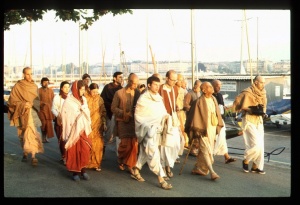CC Adi 17.293 (1975)

A.C. Bhaktivedanta Swami Prabhupada
Below is the 1996 edition text, ready to be substituted with the 1975 one using the compile form.
TEXT 293
- rāsārambha-vidhau nilīya vasatā kuñje mṛgākṣī-gaṇair
- dṛṣṭaṁ gopayituṁ svam uddhura-dhiyā yā suṣṭhu sandarśitā
- rādhāyāḥ praṇayasya hanta mahimā yasya śriyā rakṣituṁ
- sā śakyā prabhaviṣṇunāpi hariṇā nāsīc catur-bāhutā
SYNONYMS
rāsa-ārambha-vidhau—in the matter of beginning the rāsa dance; nilīya—having hidden; vasatā—sitting; kuñje—in a grove; mṛga-akṣī-gaṇaiḥ—by the gopīs, who had eyes resembling those of deer; dṛṣṭam—being seen; gopayitum—to hide; svam—Himself; uddhura-dhiyā—by first-class intelligence; yā—which; suṣṭhu—perfectly; sandarśitā—exhibited; rādhāyāḥ—of Śrīmatī Rādhārāṇī; praṇayasya—of the love; hanta—just see; mahimā—the glory; yasya—of which; śriyā—the opulence; rakṣitum—to protect that; sā—that; śakyā—able; prabhaviṣṇunā—by Kṛṣṇa; api—even; hariṇā—by the Supreme Personality of Godhead; na—not; āsīt—was; catuḥ-bāhutā—four-armed form.
TRANSLATION
“Prior to the rāsa dance, Lord Kṛṣṇa hid Himself in a grove just to have fun. When the gopīs came, their eyes resembling those of deer, by His sharp intelligence He exhibited His beautiful four-armed form to hide Himself. But when Śrīmatī Rādhārāṇī came there, Kṛṣṇa could not maintain His four arms in Her presence. This is the wonderful glory of Her love.”
PURPORT
This is a quotation from the Ujjvala-nīlamaṇi (Nāyikā-bheda 7), by Śrīla Rūpa Gosvāmī.